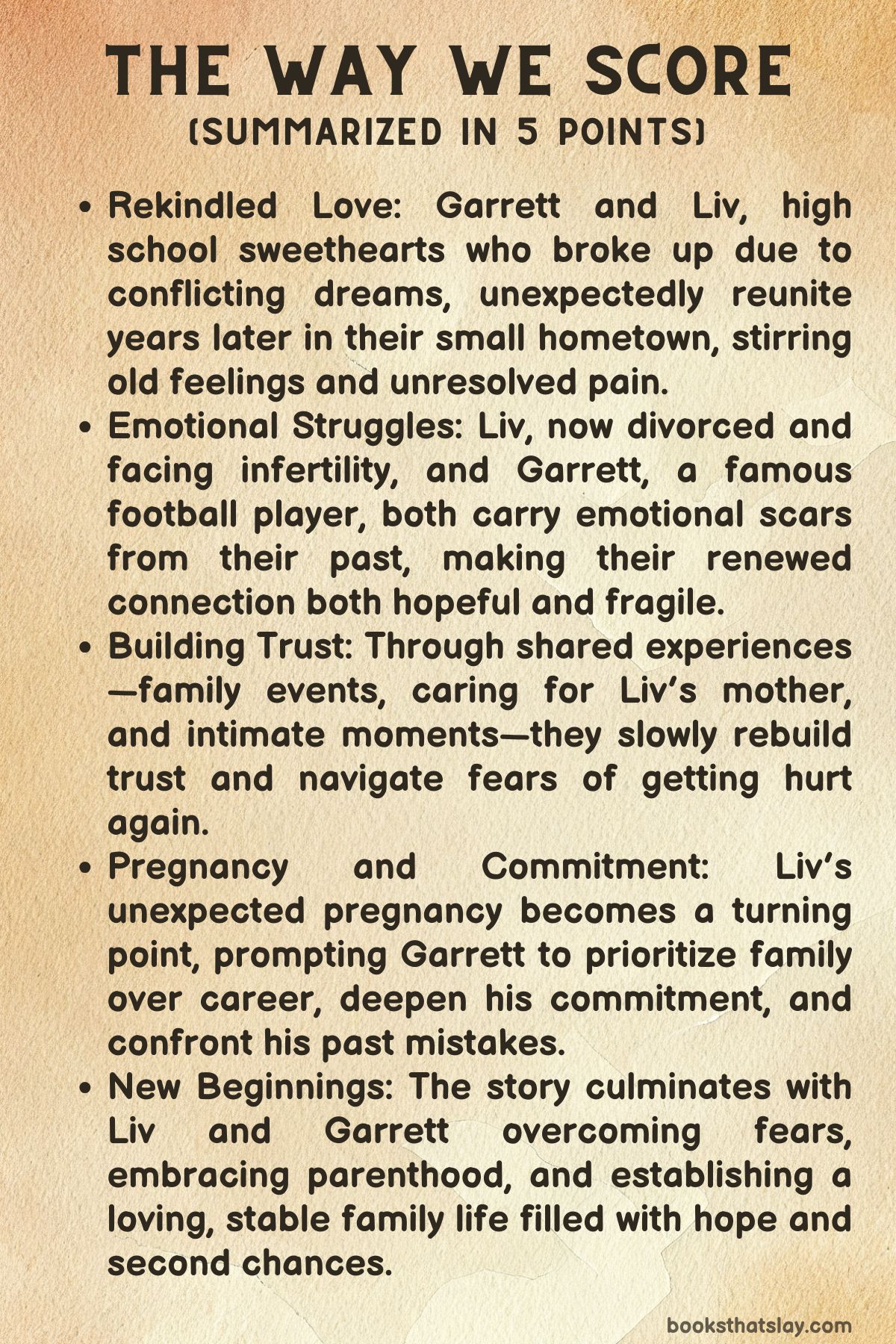The Way We Score Summary, Characters and Themes
The Way We Score by Tia Louise is a small-town second-chance romance about love, heartbreak, and healing. At its heart are Garrett, a once-celebrated high school football star turned professional athlete, and Olivia “Liv” Bankston, a determined lawyer escaping the ashes of a failed marriage.
Their paths diverged years ago when youthful dreams and ambition split them apart, but a return to their coastal hometown of Newhope forces them to confront unresolved emotions and what might still exist between them. Through a mix of nostalgia, tension, family, and rekindled intimacy, this novel explores the enduring impact of first love and the possibility of rewriting one’s story.
Summary
Garrett Bradford was once the pride of Newhope, Alabama—a football prodigy with dreams of collegiate glory and a future tied to his high school sweetheart, Olivia Bankston. Their youthful bond was intense and romantic, built on years of shared history, mutual support, and a deep affection that seemed unshakable.
But those dreams frayed when Liv, driven by her own ambitions, accepted an invitation to audition for LSU’s elite Golden Girls dance team. Garrett, expecting she would follow him to the University of Alabama, felt blindsided.
Their life trajectories veered sharply apart, leaving behind heartbreak and unfinished conversations.
Years pass. Olivia is now a successful attorney in Birmingham, navigating the fallout of a hollow marriage to Warner Oberon III—a man more concerned with status than partnership.
The marriage leaves Liv emotionally drained, especially after facing infertility and betrayal. After her divorce is finalized, she returns home to Newhope to care for her injured mother.
What she doesn’t expect is Garrett—older, more grounded, and still just as magnetic.
Their first reunion is subtle but charged. Garrett helps with chores at Liv’s family home, slipping easily into her world as if no time had passed.
Liv tries to maintain distance, wary of the emotional toll rekindling anything might take. But the pull between them is undeniable.
At a community event hosted by the Bradford family, a slow dance arranged by Liv’s sister Dylan reignites their chemistry. They move in sync, not just physically but emotionally—caught between who they were and who they’ve become.
That night, under the stars by the bay, they share a conversation years overdue. Liv speaks candidly about the pain of her marriage, her struggles with fertility, and the weight of emotional isolation.
Garrett listens, not as the boy she once knew, but as a man willing to understand without judgment. The vulnerability they share carves out a space for something new to emerge—rooted not in the fantasy of teenage dreams, but in the reality of adult choices.
Soon after, Dylan’s wedding weekend brings everyone together. Garrett reconnects with his siblings—Hendrix, Zane, Jack, and Dylan—filling the air with humor, teasing, and familial warmth.
Liv, still conflicted, tries to stay on the periphery but is drawn deeper into the fold. A quirky new addition to the circle, Raven, adds lightness and mischief.
During the bachelorette festivities, Liv engages in raunchy games and midnight confessions, surrounded by women who remind her what joy looks like.
Throughout the wedding celebrations, the tension between Garrett and Liv builds. They steal glances, engage in flirtatious banter, and share memories laced with longing.
On the wedding day, Garrett walks Liv’s mother down the aisle—a symbolic act that showcases his deep ties to her family and the community. That night, after dancing and too many drinks, Liv and Garrett fall into each other.
It’s not just about lust. It’s about release, recognition, and a love that never quite let go.
But the morning after brings doubt. Liv slips out early, telling herself it was a one-time thing, a rebound, a fantasy best left in the past.
Garrett, though heartbroken, gives her the space she believes she needs. They part again, uncertain if what sparked between them can last beyond the moment.
Liv returns to Birmingham, immersing herself in her work and trying to ignore the ache in her chest. Garrett, however, starts questioning his own future.
Football, once his everything, no longer feels like enough. After a serious conversation with his team and teammates, he asks to be released from his contract to stay in Newhope and be present for Liv and their child.
Yes—Liv is pregnant, and though she was hesitant to let herself believe in new beginnings, the baby growing inside her forces her to rethink everything.
A scare early in the pregnancy jolts Liv into fear. She rushes to the ER, terrified of losing the baby.
Garrett, learning of the emergency, immediately arranges a flight and is by her side within hours. His presence is steadying.
The doctor confirms the baby is safe, and in that moment, Garrett and Liv decide—they will face this together.
They begin to build a new life. Garrett takes a job in animal control, a far cry from the stadium lights, but a choice rooted in love and stability.
Liv transitions to working remotely, supported by a tight-knit community and surrounded by laughter and care. As the pregnancy progresses, they settle into routines, share cravings, reflect on the past, and plan for the future.
When they learn they’re having a girl, they’re flooded with dreams of what kind of parents they’ll be.
Later, Liv returns to New York briefly for one of Garrett’s games. They reunite passionately, and she witnesses firsthand his transformation—not just as an athlete, but as a man.
He scores a rare touchdown, and afterward, he proposes with the help of Dylan and the crowd. Liv, shaken but moved, says yes.
They host a retirement party filled with laughter, hugs, and tributes to Garrett’s football journey, which he now closes to open a new chapter with Liv.
But happiness is briefly threatened when her ex-husband Warner arrives uninvited, revealing he never filed the divorce papers. Garrett and Zane confront him, and under public pressure and the scrutiny of his new pregnant girlfriend, Warner finally signs.
The last barrier to Liv’s future falls away.
As the baby’s due date nears, Liv goes into labor on a walk. Garrett gets her to the hospital just in time.
Using HypnoBirthing techniques they practiced, they welcome their daughter—Gina Grace—named in honor of Miss Gina, a maternal figure in Garrett’s life. Parenthood, once a distant hope, is now real.
Six months later, the couple is thriving. Garrett is now a deputy sheriff, Liv is practicing law locally, and baby Gigi is surrounded by family, love, and chaos.
The final scene teases more surprises, including Raven’s return with a daughter who might belong to Hendrix, suggesting more love stories yet to unfold.
The Way We Score concludes not with a dramatic twist, but with quiet contentment. Garrett and Liv have learned that love isn’t just about passion—it’s about choosing each other again and again, through setbacks, healing, and the unexpected joy of starting over.

Characters
Garrett Bradford
Garrett is the emotional and moral center of The Way We Score, evolving from a high school football star to a man deeply committed to family and emotional authenticity. In his youth, Garrett is seen lounging under an oak tree with his sister Dylan, embodying a grounded, southern charm.
His reluctance toward introspection contrasts with his emotional depth, most notably expressed in his unwavering devotion to his high school sweetheart, Olivia “Liv” Bankston. His initial heartbreak—learning that Liv planned to attend LSU rather than follow him to the University of Alabama—marks a pivotal moment that fractures their youthful dreams and sets them on divergent paths.
Years later, Garrett reemerges as a man who has matured through pain and growth. Now a professional athlete, he is still guided by his deep emotional core.
When he sees Liv again, the layers of regret, longing, and unspoken love resurface, but instead of reacting with bitterness, Garrett approaches her with patience, humor, and vulnerability. His decision to leave behind his football career and embrace fatherhood by becoming a town deputy sheriff is symbolic of his transformation—from chasing fame to anchoring himself in love and stability.
Garrett is a character defined not by what he achieves on the field but by the emotional risks he takes off of it, embodying the story’s themes of redemption, emotional accountability, and the enduring power of love.
Olivia “Liv” Bankston
Liv is a complex and deeply human protagonist whose journey is shaped by love, loss, ambition, and the desire for emotional self-preservation. Early in The Way We Score, Liv is portrayed as bright, ambitious, and willing to carve out her own path—even if that means leaving Garrett and their shared small-town dreams behind.
Her decision to audition for LSU’s Golden Girls is emblematic of her desire to chase excellence on her own terms. However, her trajectory is marred by a toxic marriage to Warner Oberon III, which slowly erodes her confidence and faith in love.
By the time she returns to Newhope, Liv is emotionally frayed, fresh from signing divorce papers and nursing wounds of infertility and betrayal. Her reunion with Garrett is fraught with conflicting emotions—nostalgia, longing, guilt, and fear.
Yet, despite her initial efforts to maintain emotional distance, Liv is gradually drawn back into Garrett’s orbit, softened by his steadiness and emotional generosity. Her vulnerability comes to the surface during her pregnancy, as she admits how fragile her happiness feels.
Liv’s arc is one of cautious hope—she navigates the murky terrain between self-protection and the yearning to believe in love again. Ultimately, her willingness to accept Garrett’s love, raise a child with him, and return to practicing law in her hometown signals her quiet but powerful reclaiming of self and love.
Dylan Bradford
Dylan, Garrett’s younger sister, represents the vibrant spirit of family and feminine strength in The Way We Score. First introduced as a precocious teenager brimming with imagination, Dylan’s journey from book-loving sibling to bride-to-be is marked by warmth, loyalty, and light-hearted mischief.
She serves as a subtle catalyst for rekindling Garrett and Liv’s relationship, gently nudging them into dances and conversations during family gatherings. Dylan is not merely a background character; her own romantic journey, culminating in a wedding filled with familial joy and emotional resonance, reflects the novel’s broader themes of love, growth, and community.
Her bachelorette party, peppered with games and camaraderie, offers comic relief while also showcasing her deep bond with Liv. As a sister, bride, and soon-to-be mother figure herself, Dylan encapsulates the joy of new beginnings and the importance of shared histories.
Warner Oberon III
Warner, Liv’s ex-husband, is a representation of superficial success masking emotional bankruptcy. His character stands in stark contrast to Garrett’s emotional authenticity.
Warner is depicted as a man who was more interested in possessing Liv as a trophy than nurturing her as a partner. His emotional detachment, infidelities, and manipulative tendencies contribute to Liv’s deep sense of betrayal and trauma.
Warner’s refusal to file their divorce papers, revealed in a petty confrontation during Liv and Garrett’s engagement party, underscores his need for control and inability to accept rejection. However, his eventual public capitulation—signing the divorce papers in front of his new, pregnant partner—marks a satisfying moment of closure.
Warner is not just a failed husband; he is a mirror through which Liv sees what she never wants again, reinforcing the value of emotional reciprocity and trust that she finds anew with Garrett.
Raven
Raven, the quirky, storm-chasing meteorologist, injects freshness, unpredictability, and humor into The Way We Score. As a new member of the friend group, her eccentricities and openness quickly endear her to others.
She becomes part of the feminine support network surrounding Liv, participating in late-night games, drinks, and candid conversations. Raven is more than comic relief; her storyline unexpectedly deepens in the epilogue with the revelation that she shares a daughter with Hendrix, Garrett’s brother.
This surprise adds a new dimension to Raven’s character—she’s not just playful and bold, but also has a hidden emotional depth and backstory that ties her permanently to the Bradford family. Raven’s journey reflects the novel’s embrace of the unexpected and the ways love can bloom in surprising, even chaotic, circumstances.
Hendrix Bradford
Hendrix, one of Garrett’s brothers, is a more understated but significant figure in the Bradford family dynamic. His warm interactions with his siblings and moments of teasing show his affection and loyalty.
Hendrix’s character gains a surprising layer of complexity with the epilogue reveal that he has a secret daughter with Raven. This revelation positions him as someone who, like Garrett, must reckon with emotional responsibility and long-buried truths.
While he doesn’t have a prominent narrative arc throughout the book, Hendrix’s final role suggests future stories of healing, reconciliation, and the enduring complexity of family bonds.
Miss Gina
Miss Gina is the beloved matriarchal figure in the Bradford family, whose presence looms large even in her physical absence. Her influence is most poignantly felt during the wedding ceremony when Garrett walks her down the aisle, a gesture rich with emotional symbolism.
Miss Gina is not just a familial elder but a stand-in mother for Liv during vulnerable times. Naming their daughter Gina Grace in her honor encapsulates the reverence and emotional grounding she provides.
Her role, though not always central in dialogue or action, is foundational—she represents the rooted love, wisdom, and emotional legacy that underpins the Bradford family.
Charlie
Charlie, Garrett’s teammate and close friend, is emblematic of the brotherhood forged through sports. As Garrett contemplates leaving professional football, Charlie’s reactions reflect concern, respect, and genuine friendship.
His presence in retirement parties and personal conversations offers glimpses into Garrett’s life beyond Newhope, highlighting what Garrett is leaving behind. Charlie’s support, coupled with his willingness to share in Garrett’s celebrations, reinforces themes of loyalty, change, and the bonds that endure beyond the field.
Baby Gina Grace
Though an infant by the end of the novel, Gina Grace symbolizes renewal, hope, and the embodiment of second chances. Her impending birth prompts pivotal life choices for both Garrett and Liv, influencing everything from Garrett’s career decisions to Liv’s emotional healing.
Referred to affectionately through her stages of development—from lime to bell pepper—she is more than a baby; she is a narrative device that forces the characters to confront what they value most. Naming her after Miss Gina also roots her in a legacy of love, emphasizing that this new generation carries forward the warmth, strength, and emotional wisdom of those who came before.
Gina Grace becomes the ultimate affirmation that love, once lost, can be rediscovered and made stronger through shared commitment and growth.
Themes
Reconciliation and Second Chances
The story of Garrett and Liv in The Way We Score unfolds as a poignant portrait of individuals who must face the consequences of youthful missteps and mature into the people they needed to be for each other all along. Their reunion is not just about rekindling a romance but about confronting the emotional wounds that were left untreated for years.
Their reconnection happens gradually and organically, shaped by shared experiences and subtle realizations that time has changed them both. The pain of past choices—Liv leaving for LSU, Garrett’s inability to understand her dreams, and the pride that kept them apart—still lingers beneath their surface-level interactions, creating a rich undercurrent of regret and hope.
Yet, as they begin to reconnect through shared spaces and conversations, they find themselves drawn to what once was. The slow unfolding of their feelings is grounded in their willingness to listen, to hold space for each other’s vulnerabilities, and to admit where they went wrong.
Liv’s emotional distance and Garrett’s need to prove he’s no longer the immature boy she knew form the heart of their evolving dynamic. The rekindled romance is meaningful not because it reignites old flames, but because it reveals the possibility of becoming new people in an old love.
This is a theme built on accountability and self-awareness rather than nostalgia, offering readers a realistic depiction of how love can be mended when both people return with deeper clarity, emotional growth, and a renewed willingness to fight for each other. The journey isn’t smooth, but it’s deeply human, filled with moments that reflect how second chances aren’t granted—they’re earned.
Identity, Ambition, and Compromise
A driving force in The Way We Score is the way personal ambition can both unite and divide people. Garrett and Liv’s initial separation was rooted not in a lack of love, but in their differing visions of the future.
Garrett assumed a shared trajectory that placed football and family at the center, while Liv dreamed of professional opportunities that took her elsewhere. This dissonance between expectation and self-determination becomes a central conflict, one that simmers beneath their interactions long after they reconnect.
Liv’s career as a lawyer and her earlier success with LSU’s Golden Girls reflect her refusal to be diminished or contained by someone else’s dream. Her marriage to Warner further reinforces this theme: though externally perfect, the relationship stifled her emotional and professional autonomy, revealing how easy it is for women to become trophies in someone else’s narrative.
Garrett, too, is forced to confront what ambition has cost him. His identity was tightly bound to his role as a professional athlete, and his decision to walk away from that life so he can be present during Liv’s pregnancy signifies a redefinition of success.
It’s not that ambition is vilified—it’s the failure to adapt, communicate, and find space for each other’s aspirations that leads to heartbreak. By the end, both characters have shifted.
Garrett finds new purpose in becoming a deputy sheriff; Liv resumes her law career in a way that supports her emotional well-being. Their reconciliation rests not on one subsuming their dreams for the other, but on finding a way forward where compromise is not sacrifice, but a shared vision built from mutual respect.
Family and Chosen Community
The bonds of family, both biological and chosen, are integral to the emotional landscape of The Way We Score. From the opening scenes, Garrett’s relationship with his siblings—especially Dylan—grounds him in a world of teasing, warmth, and loyalty.
Their home in Newhope is more than a backdrop; it is a living, breathing entity filled with history, memory, and inherited values. It is in this environment that Garrett and Liv find their footing again.
The presence of Dylan, Raven, Hendrix, Jack, and Zane illustrates how family can serve as a mirror for one’s growth. Their interactions offer both levity and emotional depth, with moments of celebration, conflict, and shared nostalgia.
Liv’s own family, particularly her ailing mother Miss Gina, functions as a catalyst for her return and eventual healing. The fact that Garrett walks Miss Gina down the aisle during Dylan’s wedding adds layers to his role—not just as a romantic partner, but as someone deeply integrated into Liv’s familial world.
Moreover, the friendships between Liv and the other women—Rachel, Raven, Dylan, Allie—offer a vibrant portrayal of female camaraderie. Their games, confessions, and emotional support showcase a kind of chosen sisterhood that adds dimension to Liv’s experience beyond romance.
Later, when Liv is pregnant, this support system remains intact, symbolizing the importance of community during major life transitions. Even Garrett’s teammates, who offer advice and parting words during his retirement party, represent how kinship can be forged on fields far from home.
Family, in this story, is not just the people you’re born to, but those who show up when it matters most.
Healing from Emotional Trauma
Beneath the surface of rekindled romance and joyful reunions lies a nuanced portrayal of emotional trauma and the difficult, nonlinear path toward healing in The Way We Score. Liv carries the scars of a failed marriage marked by betrayal, objectification, and unfulfilled promises.
Her infertility, her sense of being emotionally abandoned, and the erasure of her agency within that marriage leave her guarded and skeptical. She doesn’t simply fall back into Garrett’s arms; she resists, questions, and tests the boundaries of her vulnerability.
The pregnancy scare she experiences illustrates how trauma doesn’t vanish with time—it haunts moments of happiness with fear of loss. Her instincts to flee, to label a night of reconnection as a rebound, are not signs of weakness but self-preservation mechanisms shaped by years of emotional endurance.
Garrett, in his own way, is healing too. His loneliness, the waning excitement of his football career, and the realization that professional success doesn’t equal personal fulfillment push him toward a quieter but more meaningful life.
His decision to step away from fame and relocate for Liv’s pregnancy marks not just a romantic gesture, but a symbolic reclaiming of agency and emotional priority. Their journey into parenthood becomes a vehicle for healing—not because it erases their past pain, but because it demands trust, patience, and presence.
Their daughter becomes more than a child; she is a living affirmation that joy can exist after disappointment. The story honors the messiness of healing, showing that love can be a salve, but only when paired with accountability, gentleness, and mutual understanding.
The Fluidity of Masculinity and Fatherhood
Garrett’s evolution from football star to father and lawman offers a quiet but powerful commentary on masculinity in The Way We Score. Early on, his identity is tethered to traditional markers of male success—athletic dominance, stoicism, and emotional distance.
But his character arc challenges these tropes through deliberate choices that prioritize emotional availability, nurturing, and presence. His vulnerability in expressing longing for Liv, his willingness to be physically and emotionally available during her pregnancy, and his tenderness during moments of fear all reflect a broader reshaping of masculine ideals.
His decision to leave his football career—despite backlash and peer concern—emphasizes a redefinition of loyalty and success. What matters more than legacy is presence: being the man who shows up in moments of crisis, who supports the mother of his child with words and actions, and who embraces fatherhood not as a duty but as a privilege.
The HypnoBirthing scenes, his eagerness to learn and participate, and the birth of their daughter reveal a Garrett who has discarded outdated notions of dominance for empathy and partnership. His transition into a role in animal control and eventually becoming a deputy sheriff reinforces this growth—not a demotion in status, but a realignment of priorities.
Fatherhood does not make him less of a man; it completes him. Through Garrett, the book offers a vision of masculinity that is emotionally fluent, protective without being possessive, and grounded in love rather than pride.
In doing so, it positions caregiving, communication, and humility as central to what it means to be a good man and father.


